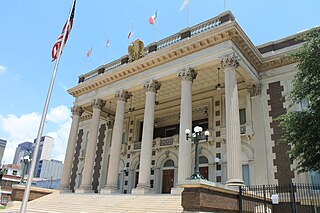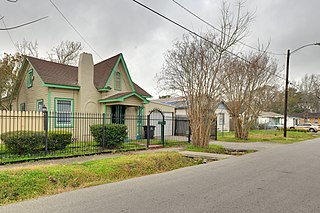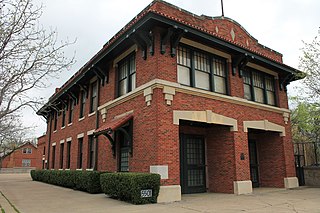
Wheatley Place is a neighborhood in South Dallas, Texas, that is designated as a historic district on the National Register of Historic Places (NRHP) and as a somewhat smaller Dallas Landmark District by the city. Included among the buildings that compose the historic district is the Juanita J. Craft Civil Rights House, a museum that was the former home of Dallas civil rights pioneer, Juanita Craft. The house is a Recorded Texas Historic Landmark and is included within the NRHP district but not the municipal landmark district.

The Texas School Book Depository, now known as the Dallas County Administration Building, is a seven-floor building facing Dealey Plaza in Dallas, Texas. The building was Lee Harvey Oswald's vantage point during the assassination of United States President John F. Kennedy on November 22, 1963. The Warren Commission concluded that Oswald, an employee at the depository, shot and mortally wounded President Kennedy from a sixth floor window on the building's southeastern corner. Kennedy died at Parkland Memorial Hospital.

The West End Historic District of Dallas, Texas, is a historic district that includes a 67.5-acre (27.3 ha) area in northwest downtown, generally north of Commerce, east of I-35E, west of Lamar and south of the Woodall Rodgers Freeway. It is south of Victory Park, west of the Arts, City Center, and Main Street districts, and north of the Government and Reunion districts. A portion of the district is listed on the U.S. National Register of Historic Places as Westend Historic District. A smaller area is also a Dallas Landmark District. The far western part of the district belongs to the Dealey Plaza Historic District, a National Historic Landmark around structures and memorials associated with the assassination of John F. Kennedy.

The Dal-Tex Building is a seven-story office building located at 501 Elm Street in the West End Historic District of downtown Dallas, Texas, United States. The building is located on the northeast corner of Elm and North Houston streets, across the street from the Texas School Book Depository in Dealey Plaza, the scene of the assassination of U.S. President John F. Kennedy on November 22, 1963. The Dal-Tex Building, sometimes called the Dallas-Textiles Building, the Dal-Tex Market Building, or the Dal-Tex Mart Building, was a center of the textile business in Dallas.

The Kirby Building, historically known as the Busch Building, is a 17-story skyscraper in the Main Street District of Downtown Dallas. The structure was completed in 1913 by beer magnate Adolphus Busch to accompany his nearby Hotel Adolphus. The building became vacant with many older buildings during the economic downturn of the 1980s. While the building was symbolic of downtown's crash in the 1980s, it also served as a symbol of the start of the resurrection as it became the first high-rise to be converted from office use to residential apartments. The structure is a Dallas Landmark and listed on the National Register of Historic Places.

The original Franciscan mission, Nuestra Señora de la Concepción del Socorro, was founded in 1682 by the Franciscan order, to serve displaced Spanish families, American Indians from New Mexico, who fled the central New Mexico region during the Pueblo Revolt. The present Socorro Mission was constructed around 1839 to replace an earlier 18th-century mission destroyed in 1829 by flooding of the Rio Grande. The mission, constructed of adobe surfaced with stucco, is particularly notable for its interior. The finely painted and decorated beams, or vigas, are from the 18th-century mission and were reused when the present church was constructed. The massing, details and use of decorative elements of the Socorro Mission show strong relationships to the building traditions of 17th-century Spanish New Mexico.
The Montgomery Ward Building in downtown San Angelo, Texas was a historic department store building designed by architect Oscar Ruffini. It was built in 1927 and was listed on the National Register of Historic Places in 1988.

The Dallas Scottish Rite Temple is a monumental structure in the Farmers Market District of downtown Dallas, Texas. Constructed in 1913 as an official headquarters for use by the Scottish Rite Masons and other local Masonic lodges, it is a fine example of early 20th century Beaux Arts Classical architecture in Texas. The structure, a Dallas Landmark and Recorded Texas Historic Landmark, is listed on the National Register of Historic Places and is a contributing property in the Harwood Street Historic District.

The Indianapolis Park and Boulevard System is a group of parks, parkways, and boulevards in Indianapolis, Indiana, that was designed by landscape architect George Edward Kessler in the early part of the twentieth century. Also known as the Kessler System, the district includes 3,474 acres (1,406 ha) and has shaped the city through the present day. This historic district was added to the National Register of Historic Places in 2003.

Dallas High School was a public secondary school in Dallas, Texas. It is the alma mater of several notable Americans, including former U.S. Attorney General and Supreme Court Justice Tom C. Clark. Built in 1907, the 3.5-story classical revival structure is located in the downtown City Center District next to the Pearl/Arts District DART light rail station.

The Throckmorton County Courthouse and Jail, in Throckmorton, Texas, was listed on the National Register of Historic Places in 1978. It is also a State Antiquities Landmark and a Recorded Texas Historic Landmark.

Clements Hall, formerly known as Atkins Hall, is a historic building on the campus of Southern Methodist University in University Park, Texas, U.S.. It was built in 1915, and designed by Shepley, Rutan and Coolidge in the Georgian Revival architectural style. It has been listed on the National Register of Historic Places since September 27, 1980.

Snider Hall is a historic building on the campus of Southern Methodist University in University Park, Texas, U.S.. It was built in 1927, and designed by Wyatt C. Hedrick in the Georgian Revival architectural style. It has been listed on the National Register of Historic Places since September 27, 1980.

The Lamesa Farm Workers Community Historic District in Los Ybanez in Dawson County, Texas, was listed on the National Register of Historic Places in 1993. It is a 50 acres (20 ha) historic district which included 32 contributing buildings.

The Washington County Courthouse at 110 E. Main in Brenham, Texas is an Art Deco-style courthouse built in 1939. It was listed on the National Register of Historic Places in 1990 and is also part of the National Register-listed Brenham Downtown Historic District.

The Independence Heights Residential Historic District is a 70 acres (28 ha) historic district in the Independence Heights neighborhood of Houston, Texas which was listed on the National Register of Historic Places in 1997.

Dallas Fire Station No. 16, at 5501 Columbia Ave. in Dallas, Texas, was built in 1917. It was listed on the National Register of Historic Places in 1997.

Stevens Park Golf Course is a public golf course in the Kessler area of Dallas, Texas United States. Often described as the "Little Augusta" of North Texas, the course is located just west of Downtown Dallas and nestled between the Stevens Park Estates and Kessler Park neighborhoods.






















